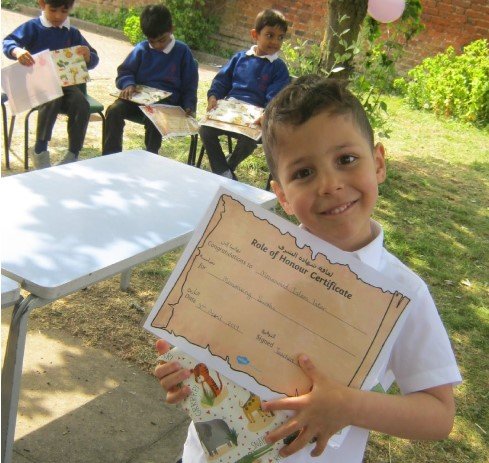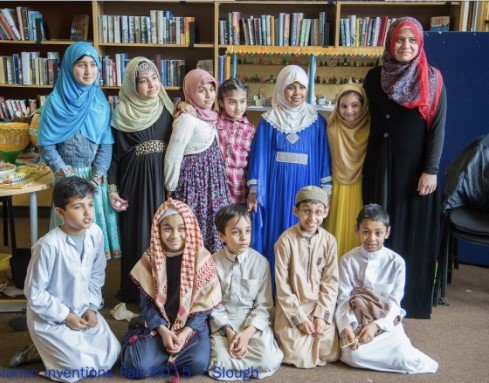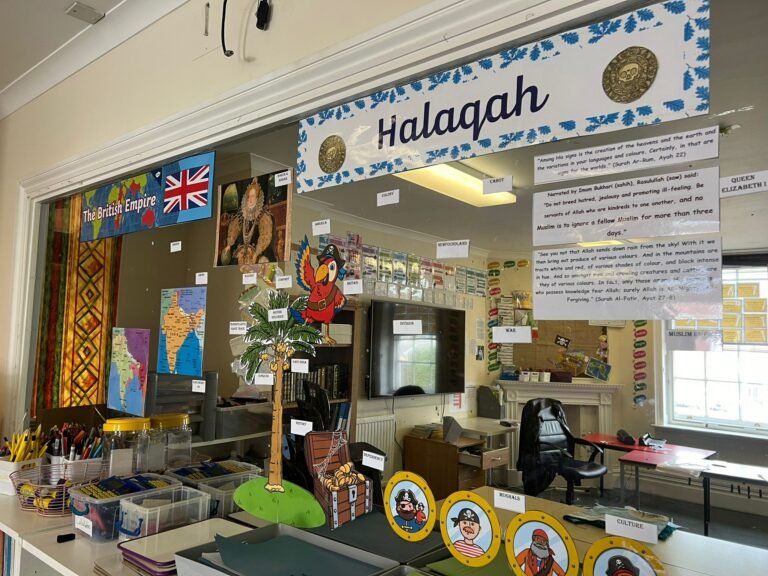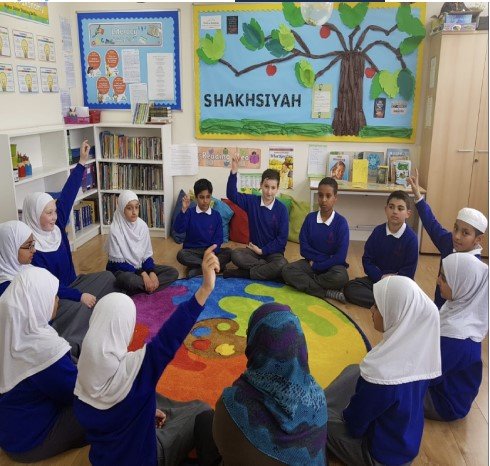The seven Principles of Shakhsiyah Education have been devised through research and practice in Shakhsiyah Schools over twenty years of research and practice. They are built on a solid foundation understanding ourdeen as Iman, Islam and Ihsan. At Shakhsiyah Education, we relate these to foundational Islamic educational concepts that is, tarbiyah, t’alīm and t’adīb. These principles shape every aspect of our work, and bind Shakhsiyah Schools into learning communities that bring children, young people, teachers and parents together.
Our Guide on the Principles of Shakhsiyah Education offers a detailed overview for educators. A summary of the principles is given below.
Understanding that our niyyah (intention) when we learn is to grow towards Allah, which is the ultimate purpose of the human being.
✓ Significance: Cultivates a sense of purpose and meaning in learning all subjects. Children love learning for the sake of Allah.
✓ Practical Application: Encourage learners to reflect on their intention at all times, is my niyyah and learning aligned with the ultimate purpose of the human being?
✓ Examples: Setting meaningful goals, exploring the aims and outcomes of learning and of actions, holding ourselves accountable.





Understanding that our niyyah (intention) when we learn is to grow towards Allah, which is the ultimate purpose of the human being.
✓ Significance: Cultivates a sense of purpose and meaning in learning all subjects. Children love learning for the sake of Allah.
✓ Practical Application: Encourage learners to reflect on their intention at all times, is my niyyah and learning aligned with the ultimate purpose of the human being?
✓ Examples: Setting meaningful goals, exploring the aims and outcomes of learning and of actions, holding ourselves accountable.


Working closely with families to acknowledge and nurture each child’s unique character, imbuing children with agency and conviction in their imān (faith), and with reflective practice of their dīn.
✓ Significance: Ongoing shakhsiyah development at the heart of wider academic and other learning.
✓ Practical Application:Building dynamic parent-teacher-learner relationships and upholding human-scale personalised education.
✓ Examples: Regular and sustained dialogue in halaqah sessions. Learners reflect on their own character and relationship with Allah.




Working closely with families to acknowledge and nurture each child’s unique character, imbuing children with agency and conviction in their imān (faith), and with reflective practice of their dīn.
✓ Significance: Ongoing shakhsiyah development at the heart of wider academic and other learning.
✓ Practical Application:Building dynamic parent-teacher-learner relationships and upholding human-scale personalised education.
✓ Examples: Regular and sustained dialogue in halaqah sessions. Learners reflect on their own character and relationship with Allah.


Leading by example through engaging in professional and personal learning: a constant quest for ‘ilm, ihsān and taqwa (knowledge, excellence and awareness of Allah (swt).
✓ Significance: A Muslim is duty bound to always keep learning, especially if they are also teaching.
✓ Practical Application: Teachers lead by example, they role model curiosity and intellectual humility by researching and exploring curriculum themes alongside learners.
✓ Examples: Inviting parents to inspire students through sharing their own learning journeys. Studying the leadership and learning of Muslim personalities from the past and present.





Leading by example through engaging in professional and personal learning: a constant quest for ‘ilm, ihsān and taqwa (knowledge, excellence and awareness of Allah (SWT).
✓ Significance: A Muslim is duty bound to always keep learning, especially if they are also teaching.
✓ Practical Application: Teachers lead by example, they role model curiosity and intellectual humility by researching and exploring curriculum themes alongside learners.
✓ Examples: Inviting parents to inspire students through sharing their own learning journeys. Studying the leadership and learning of Muslim personalities from the past and present.



The principle of halaqah as a prophetic pedagogy that synthesises tarbiyah, ta‘līm and ta’dīb and is at the heart of the wider holistic curriculum.
✓ Significance: Adopting a Prophetic Pedagogy that connects all learning to Allah (swt). Learning is relational and reflective instead of storing facts and information.
✓ Practical Application: Daily halaqah for children to ground their school experience; regular teachers halaqah; regular family halaqah.
✓ Examples: Children have the space and time to talk about what Islamic concpets mean for their daily lives. Children connect to Qur’ān in halaqah by discussing the meanings of key surāt that they have memorised.





The principle of halaqah as a prophetic pedagogy that synthesises tarbiyah, ta‘līm and ta’dīb and is at the heart of the wider holistic curriculum.
✓ Significance: Adopting a Prophetic Pedagogy that connects all learning to Allah (swt). Learning is relational and reflective instead of storing facts and information.
✓ Practical Application: Daily halaqah for children to ground their school experience; regular teachers halaqah; regular family halaqah.
✓ Examples: Children have the space and time to talk about what Islamic concpets mean for their daily lives. Children connect to Qur’an in halaqah by discussing the meanings of key surāt that they have memorised.



The principle of Qur’ānic Arabic as the language of Islam and as essential to nurturing shakhsiyah and Muslim culture.
✓ Significance: Developing a deep Connection with the Qur’ānic message and its layers of meaning.
✓ Practical Application: Incorporating Qur’ānic concepts in the thematic curriculum and in individual lessons.
✓ Examples: Exploring the Qur’ānic concept of tawakkul in the year 5 theme ‘Depending on Allah’ and ‘adl in the Year 6 theme Justice and Equality






The principle of Qur’anic Arabic as the language of Islam and as essential to nurturing shakhsiyah and Muslim culture.
✓ Significance: Developing a deep Connection with the Qur’anic message and its layers of meaning.
✓ Practical Application: Incorporating Quranic concepts in the thematic curriculum and in individual lessons.
✓ Examples: Exploring the Qur’anic concept of tawakkul in the year 5 theme ‘Depending on Allah’ and ‘adl in the Year 6 theme Justice and Equality



The principle of a holistic, integrated, thematic curriculum with the Halaqah curriculum at its core.
✓ Significance: Creating meaningful connections for children between Islamic teachings, and all other areas of learning as well as meaningful connections across the sciences, arts and humanities.
✓ Practical Application: Designing Cross-Curricular Themes with Halaqah Sessions at the core so learning is infused into every subject
✓ Examples: In the Circles and Cycles theme, children look at this sunnah of Allah in creating cycles. They explore the rise and fall of peoples in History, connecting this with the cycle of making taubah and learning through mistakes, they compare the majesty of the cycles of the solar system, the water cycle and our role as khalifa tul ‘arḍ.





The principle of a holistic, integrated, thematic curriculum with the Halaqah curriculum at its core.
✓ Significance: Creating meaningful connections for children between Islamic teachings, and all other areas of learning as well as meaningful connections across the sciences, arts and humanities.
✓ Practical Application: Designing Cross-Curricular Themes with Halaqah Sessions at the core so learning is infused into every subject
✓ Examples: In the Circles and Cycles theme, children look at this sunnah of Allah in creating cycles. They explore the rise and fall of peoples in History, connecting this with the cycle of making taubah and learning through mistakes, they compare the majesty of the cycles of the solar system, the water cycle and our role as khalifa tul ‘ardh.



The principle of the individual learner (shakhs) at the heart of assessment so that assessment is formative for the learner’s growth towards Allah.
✓ Significance: Individualised evaluation of children’s unique learning journeys and specific goals setting to ensure they fulfil their unique potential.
✓ Practical Application: Involving children in reflecting on their learning through end of theme exhibitions and building up their physical Learning Journey booklets.
✓ Examples: Peer Feedback in Art, Craft Design and Technology, Self-Assessment in Mathematics, Evaluating children’s independent learning projects.





The principle of the individual learner (shakhs) at the heart of assessment so that assessment is formative for the learner’s growth towards Allah.
✓ Significance: Individualised evaluation of children’s unique learning journeys and specific goals setting to ensure they fulfil their unique potential.
✓ Practical Application: Involving children in reflecting on their learning through end of theme exhibitions and building up their physical Learning Journey booklets.
✓ Examples: Peer Feedback in Art, Craft Design and Technology, Self-Assessment in Mathematics, Evaluating children’s independent learning projects.


